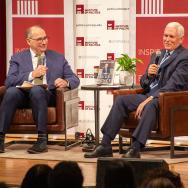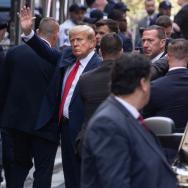How concerned should we be about the future of our democracy?
Experts, officials from battleground states, researchers and journalists debated that question and more during a Sept. 26 event at the University of Chicago’s Rubenstein Forum. The event, “Democracy and Distrust: Overcoming Threats to the 2024 Election,” was organized by the Chicago Project on Security & Threats and The Guardian newspaper.
“Tonight’s program is an exploration of the threats to American democracy and the ways in which our institutions—government, community, education and the media—can and must combine to preserve and protect what we hold dear,” said Robert Pape, UChicago professor of political science and the CPOST director.
In the keynote address, Michigan Secretary of State Jocelyn Benson, who oversaw the state’s 2020 and 2022 elections, talked about the importance of equity.
“I believe ultimately the best chance we have in our country for equality, for equity, for everyone having equal access to power and opportunity in our country begins and ends with equal access to the vote,” Benson said.
Benson’s remarks focused largely on the realities that she has witnessed, both harrowing and hopeful. She recounted one night in December 2020 when dozens of armed people showed up outside her home. She recalled thinking how little stood between the angry crowd and her family.
“I also thought at that moment: Is this what it means to defend democracy, protecting my family against threats of violence at our doorstep while trying to protect the accurate results of a legitimate presidential election?”
Before the 2020 election, her office worked with local clerks to modernize the state’s voter registration systems. They implemented automatic voter registration, sent absentee ballot request forms to every registered voter in the state and installed more than 1,000 secured drop boxes across Michigan. They partnered with nonpartisan organizations to provide access to information around their right to vote.
“As the accurate results of the election began to be known, we thought we would see cause for celebration, not because one person won or the other, but because we had protected our elections,” Benson said. “In the days and weeks that followed, we battled an unprecedented, unexpected, nationally coordinated effort to interfere with the tabulation of valid votes, to block the certification of the election results, and attempt to submit a false alternate slate of electors. Through all of that, and particularly on Jan. 6, it became clear to me that the work that we had done throughout 2020 to protect and defend democracy was just the beginning.”
Pape, an expert on U.S. national security, underscored the need to focus on the majority of Americans who want to defend democracy from threats, even, as CPOST’s research shows, there is a “dedicated minority of millions of Americans willing to support force to overturn election results.”
Radicals enter mainstream
The CPOST research has shown that support for political violence has moved into the mainstream: Of the 1,066 charged for the Jan. 6 insurrection as of mid-August, only 13% are Oathkeepers, Proud Boys and members of other militia groups—meaning almost 90% of those who went to the Capitol were not part of this fringe. The mainstream portion of the group, Pape said, consists of business owners, doctors, lawyers, architects and others we would not typically deem extremists.
In their national surveys of anti-Democratic attitudes among Americans, CPOST researchers have explored the distrust of Democratic institutions, political conspiracy theories and lack of restraint in support for political violence.
Overall, Pape said, the tracker suggests that Americans are more deeply distrustful of their democratic institutions and democratically elected leaders and more supportive of political violence to achieve political goals. Violent support for former President Donald Trump is up since summer 2021 and more Americans radically opposed to preventing Trump from returning to the White House. The findings suggest that the country has to prepare for a much more intense and potentially more violent politics as the Trump trials and primaries commence.
Pape also pointed to positive news in the research, or at least an opportunity to counter the more concerning survey results: The researchers consistently found that 80% of Americans—including 80% of Republicans and 80% of Democrats—abhor political violence and strongly support bipartisan solutions to stop it.
“Given our polarized times, this is a remarkable agreement,” Pape said. “We should lean into this common ground that recognizes the enduring importance of the democratic norm of restraint in the use of force to settle political disputes.”
The event closed with a panel moderated by Guardian democracy reporter Sam Levine and featured people closely involved in recent elections: Georgia election official Gabriel Sterling, who helped manage the 2020 presidential election and recount in Georgia; Nevada Attorney General Aaron D. Ford; and Black Voters Matter founder LaTosha Brown, an expert in Black voting rights and voter suppression.
Cascading threats
The trio began by describing what they see as the greatest threats to future elections. Sterling discussed cascading threats: The possibility that violence at the polls on the East Coast will have a trickle-down effect and keep people at home across the country or spur copycat actors, or foreign actors spreading misinformation that incites violence here at home.
Brown voiced concerns that the country has not yet equated racial violence as being part of political violence.
“When we're not honest to deal with what we're facing in this country, then we're not going to really get to the root of the problem,” she said. “When we're talking about political violence, we're talking about something greater. Because really, the root of all violence is in this notion that humanity is in some way less, it has a lesser value for some people than others.”
Ford reiterated Sterling and Brown’s concerns and noted one of the points from Pape’s presentation: The extremists are also in the mainstream.
He pointed to his predecessor, who argued that the election was stolen. “We talk about the 80 and the 20%, but I think that we have to talk about the 20% relative to them not just being the fringe of the fringe: They are neighbors of those in this room,” Ford said. “It's not as fringe as you would think.”

